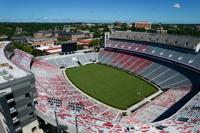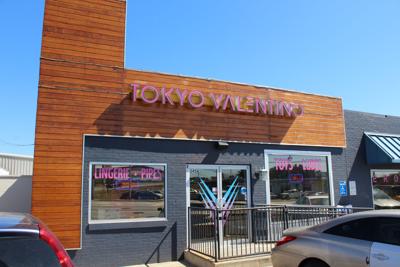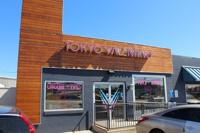Amid an ongoing legal battle with a local sex shop, the Marietta City Council is set to vote Wednesday on an overhaul of its businesses governing “adult establishments.” The proposed law would add new hurdles for adult businesses, namely a special license.
City attorney Daniel White said at a Monday work session that the new ordinance came out of closed-door discussions last month where council members indicated they wanted to update the city’s sex shop laws, which haven’t been altered in more than two decades.
Those discussions occurred during an executive session to discuss litigation, White said.
The city is being sued in two courts by the same business — Tokyo Valentino, a sex shop located on Cobb Parkway across from the Marietta Diner.
At the work session, the council voted unanimously to advance the proposed ordinance to Wednesday’s regular meeting. White asked the council to consider waiving the second vote that would normally be required.
The city has retained attorney Scott Bergthold to craft the new ordinance. Bergthold, based out of Chattanooga, specializes in drafting — and defending in court — local laws that crack down on sexually oriented businesses.
Tokyo Valentino owner Michael Morrison has waged legal battles against other metro Atlanta municipalities in defense of his stores. Some of those governments, including Cobb County, have also enlisted Bergthold.
The county successfully forced a Tokyo Valentino location in east Cobb to close after it rewrote its sex shop ordinance.
“Cobb County did this recently last year, implemented similar ordinance changes very successfully,” Bergthold told the council Monday. “They were involved in some ongoing litigation that resolved favorably for the county within about a year after they updated their ordinances.”
The Marietta council voted to suspend the Marietta shop’s business license in the summer of 2020, but the store has remained open. Tokyo Valentino is appealing the decision in Cobb County Superior Court and has also filed a federal lawsuit against the city on constitutional, free speech grounds.
In the Cobb case, Superior Court Judge Gregory Poole has scheduled a hearing for Oct. 7 at 9 a.m.
In the federal case, Judge Amy Totenberg has asked the parties to file motions for summary judgment by Aug. 23. If a judgment isn’t reached, that case would go to trial, White told the MDJ.
Cary Wiggins, an attorney representing Tokyo Valentino, didn’t return a call seeking comment.
Presenting the ordinance to the council, Bergthold said that the U.S. Supreme Court has ruled that cities can’t ban sexually oriented businesses outright, but can regulate them to prevent negative “secondary effects.” Regulations on licensing, inspections, hours of operations and zoning are all legally defensible, he said.
“From blight, increased crime, decreased property values of surrounding uses … Personal and property crimes and the public safety risks that go along with those crimes, lewdness and sexual type crimes like you might expect, illicit drug use and trafficking, litter, aesthetics, traffic, noise, etc.,” Bergthold said.
The new ordinance, more than 20 pages and chock-full of legal citations, follows “a well-worn path in the case law for what cities can and cannot do in this space,” Bergthold said.
Details
The ordinance before the council Wednesday primarily deals with licensing. White said a separate ordinance dealing with zoning will be considered next month. Already, sex shops in Marietta are limited to certain commercial and industrial zoning categories.
The new ordinance would create a new, special “adult establishment license” required for sex shops to operate in the city. Employees would also have to receive a special license from the city.
The proposed ordinance includes a host of reasons the city can deny a license, including if the business or its operator has, in the past five years, been found by a court to be operating unlawfully, been enjoined by a court from engaging in conduct prohibited by law, been held in contempt of court for violating a court order, been declared by a court to be a nuisance, or been subject to court order requiring closure of the business.
The city could also deny a license if the applicant has engaged in “any misrepresentation of fact, or omission of material fact, concerning the nature of the business.”
The license would have to be renewed annually. If denied, suspended or revoked, the ordinance lays out an appeal process, with a right to a hearing for an applicant who has been denied.
Also new would be restrictions on hours — an adult establishment would not be allowed to operate between midnight and 6 a.m. Other regulations would govern occupancy, lighting, store configuration, building materials and more.
The city already does not allow adult establishments to serve alcohol.
Currently, sex shops cannot be within 1,000 feet of multifamily or single family zoning, nor within 1,000 feet of a church, school, library, civic center, park or playground. A new provision would also prevent it from being within 500 feet of another adult establishment.
Copying Cobb’s strategy
Last summer, Cobb Superior Court Judge LaTain “Tain” Kell ordered the closure of the east Cobb Tokyo Valentino location, citing violations of county ordinance.
The ruling came after the Cobb Board of Commissioners rewrote the county’s sex shop code to increase the required distance between sex shops and places such as schools, churches and government buildings, effectively legislating the east Cobb store out of existence.
Asked if Marietta was seeking to mirror Cobb’s strategy, White said, “I’m not going to characterize it.”
“All I’ll say is that … the ordinance has not been updated substantially since 1996, and there’s been a lot of case law in the meantime,” White told the MDJ.
County officials had accused Tokyo owner Morrison of applying for a business license under the guise of operating a normal clothing store, without disclosing the business would be a sex shop. More than 3,000 people signed a petition opposing the east Cobb store in 2020, when the store’s sexual nature became public.
The Marietta store faced a similar backlash upon opening, but has remained in business the past two years as litigation stalled.
White didn’t want to speculate on the outcome of the lawsuits, but said the new ordinance would affect them.
“Whether this ordinance is adopted and how that affects it, that’s gonna change some of the issues that can be raised in both cases,” he said.
Council members advanced the measure Monday with almost no discussion. The council will meet for its voting meeting Wednesday at 7 p.m. at City Hall, 205 Lawrence St.











(0) comments
Welcome to the discussion.
Log In
Keep it Clean. Please avoid obscene, vulgar, lewd, racist or sexually-oriented language.
PLEASE TURN OFF YOUR CAPS LOCK.
Don't Threaten. Threats of harming another person will not be tolerated.
Be Truthful. Don't knowingly lie about anyone or anything.
Be Nice. No racism, sexism or any sort of -ism that is degrading to another person.
Be Proactive. Use the 'Report' link on each comment to let us know of abusive posts.
Share with Us. We'd love to hear eyewitness accounts, the history behind an article.